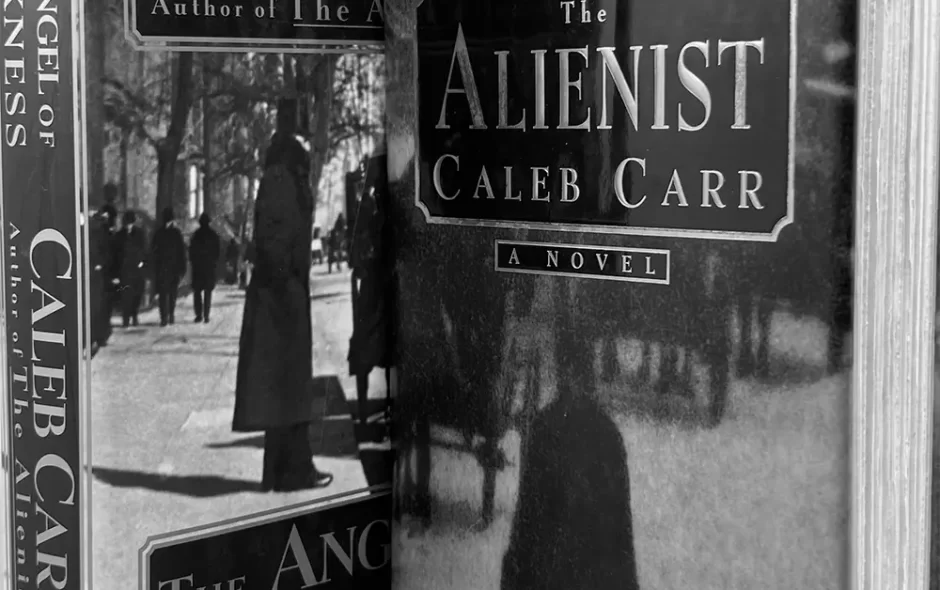It is with great sadness that 17th Street acknowledges the passing of Caleb Carr, who died on Thursday, May 23, at the age of 68. According to The New York Times, he died at his home in Cherry Plain, NY. He had been fighting a difficult battle with cancer.
Although best known for his Alienist novels, Caleb’s career was long and varied. Beginning with America Invulnerable: The Quest for Absolute Security from 1812 to Star Wars in 1989 (co-written with friend and mentor, James Chace), Caleb wrote extensively about military history and national security. His most prominent non-fiction works included a biography of Frederick Townsend Ward, The Devil Soldier: The American Soldier of Fortune Who Became a God in China, and an examination of the history of terrorism, The Lessons of Terror: A History of Warfare Against Civilians. In addition, Caleb was the editor of Random House’s Modern Library War Series and was a contributing editor to MHQ: The Quarterly Journal of Military History. In the mid-2000s, he also spent a number of years teaching military history studies at Bard College as a Visiting Professor.
Outside of academia, Caleb spent a number of years working in the film industry and theatre whilst freelancing in the 1980s. His work in the film industry continued into the 1990s, and he was involved with several TV mini series and films as a presenter, executive producer, and writer. Most notably, he wrote the TV movies Bad Attitudes in 1991 and The Warlord: Battle for the Galaxy in 1998, and was credited as a co-writer for Exorcist: The Beginning and Dominion: Prequel to the Exorcist in 2004 and 2005, respectively. Testifying to his versatility, Caleb started working as a librettist with friend and composer Ezequiel Viñao in the 1990s on Merlin, an opera based on the Arthurian legends, and he even tried his hand at politics: he ran as a Democrat for the Rensselaer County Legislature in 2005, but was unsuccessful.
Despite these varying areas of interest, it was through fiction that Caleb’s talents shone brightest. Although he described his first novel Casing the Promised Land as “roman à clef nonsense,” his subsequent works were enormously successful. In 1994, The Alienist spent six months on The New York Times bestseller list, won the 1995 Anthony Award for Best First Novel, and was nominated for the 1995 Bram Stoker Best Novel Award. Its sequel, The Angel of Darkness, was similarly well-received when it was published in 1997 and outsold its predecessor. In 2000, Caleb made an unanticipated venture into sci-fi with a serial for Time magazine, Killing Time, which was later published in book form, before returning to his roots in historical fiction with The Italian Secretary: A Further Adventure of Sherlock Holmes, which the Doyle estate commissioned in 2005. After taking a break for several years, Caleb then returned to fiction in 2012 with his Dark Age saga, The Legend of Broken, and surprised fans four years later with Surrender, New York, a contemporary thriller set in upstate New York with strong ties to the Alienist novels.
In addition to Surrender, the mid-2010s heralded a second exciting announcement for Caleb’s loyal readership: Mulholland Books would be publishing the long-anticipated continuation of the Alienist series. The continuation was set to comprise two novels, but due to delays and significant illness, the plans were unfortunately not able to come to fruition. Instead, Caleb’s last book, My Beloved Monster: Masha, the Half-wild Rescue Cat Who Rescued Me, was released in April of 2024. A deeply personal work, the memoir is a love story documenting his life and shared bond with his feline companion, Masha.
As the owner of 17th Street, I did not want to leave this moment unmarked on a personal level. Although Caleb was a deeply private person, he was always supportive of 17th Street and I sincerely valued his generosity and kindness. While I am sure that his many loyal readers will indeed be sorry that he was unable to complete the Alienist series as planned, I know that in the last years of his life, he didn’t feel that he had more than one book left–and he wanted that book to be for Masha. I am only grateful that he lived to see the outpouring of support and praise My Beloved Monster received on its publication last month. I will miss his friendship deeply.
17th Street will remain active and I will be spending the second half of 2024 remembering Caleb’s works, including The Alienist which was published thirty years ago in 1994. I hope you will join me in continuing to show your support for an author who endured much, but whose works have made an enormous difference for the better in so many people’s lives.
Photo Credit: William von Hartz




